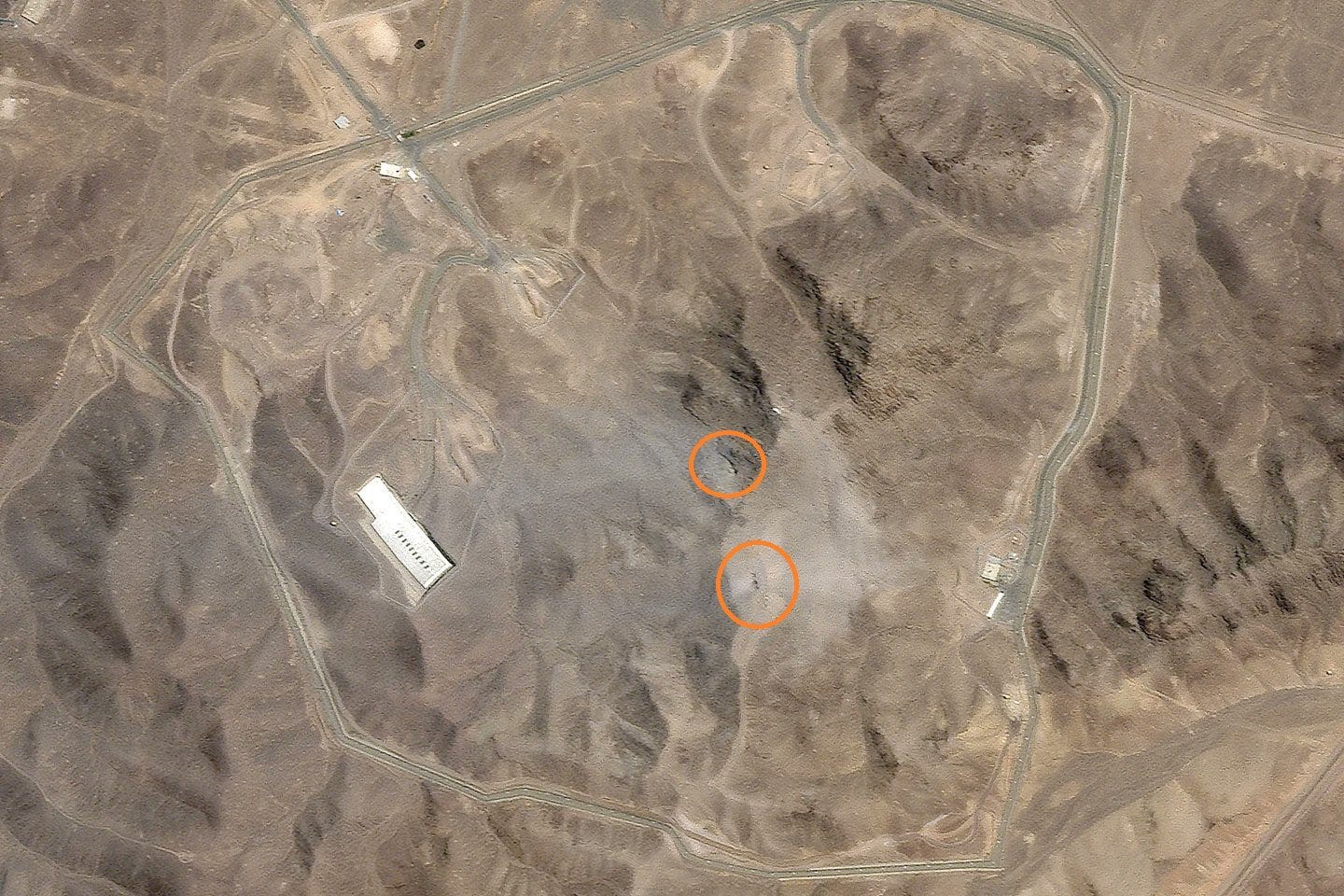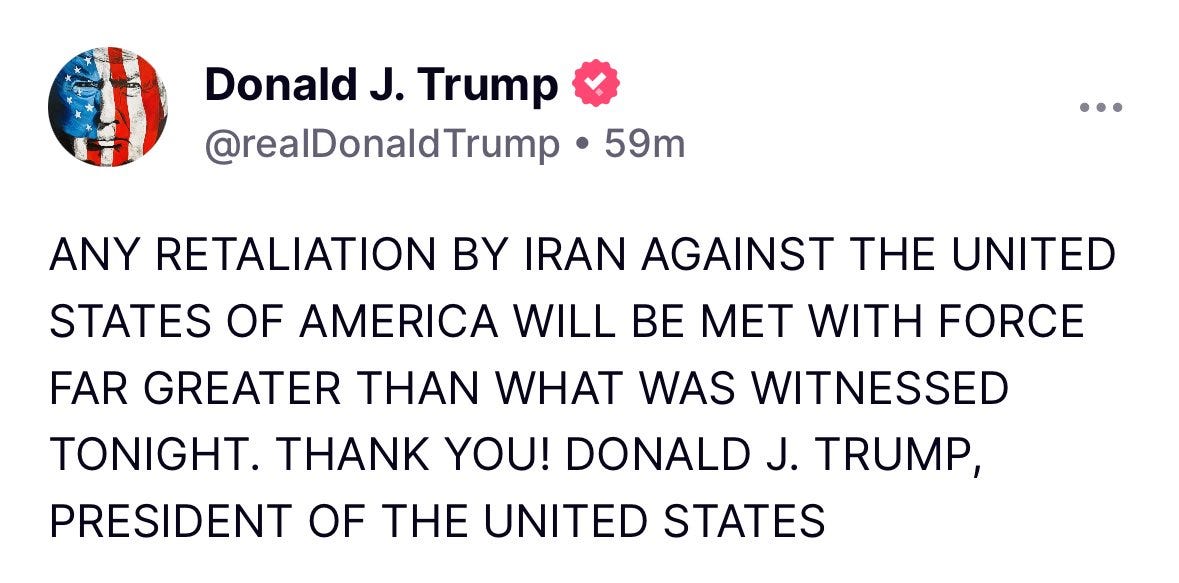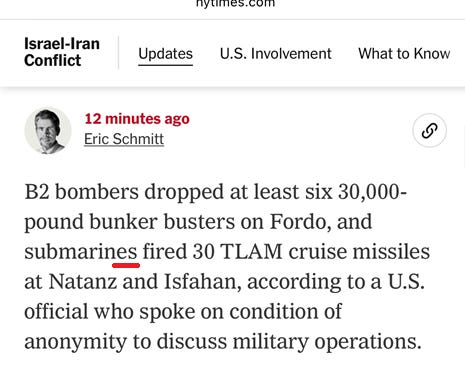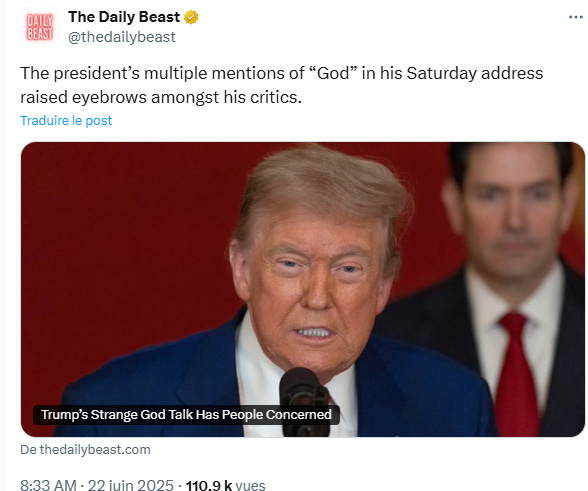MAKE AMERICA GOLF AGAIN
In launching an attack on Iran - Operation Midnight Hammer - President Trump has forsaken the trust of countless Americans who did not vote for him to pursue such a course.
In a reckless move, Donald Trump has authorized military strikes on Iran that risk igniting a Third World War—if, indeed, these strikes are as the Pentagon portrays them, a claim that remains far from certain, as we will explore further below. We have swifly rebranded “Operation Midnight Hammer” into “Operation Midnight Putter” (we discarded “Operation Midnight Bummer” since a bummer if not a blunt object). Here is why.
The threshold for military escalation may not yet have been crossed, but the bond between Donald Trump and his voter base has been irrevocably strained. Likewise, the confidence of the global community in the American president's word has been shattered. Who would engage in earnest diplomacy with an administration that prioritizes transactional deal-making and disregards the cornerstone of international relations: the honor of agreements?
By targeting Iran’s nuclear infrastructure, an illegal move as per international law, Donald Trump has forsaken the central mandate entrusted to him by the American electorate: to steer clear of foreign entanglements, echoing the wisdom of John Quincy Adams, the sixth U.S. president, who cautioned against chasing monsters abroad.
Driven by unbridled narcissism, Donald Trump has acted both against reason and the best interests of the United States, heedless of the historical legacy he will leave behind. Beyond the grave geostrategic and military ramifications of his impulsive decision, he has, at the very outset, dismantled the coalition that propelled him to victory and secured the GOP’s control of both houses of Congress. His presidency may effectively be over, regardless of how many PAC he launches to primary out recalcitrant republicain lawmakers like Thomas Massie. In a stunning turn, he has accomplished what the deep state could not achieve in over 10 years of relentless effort. He is now a lame duck, relegated to petulantly venting his frustrations on Truth Social. For the remainder of his term, MAGA may well come to mean "Make America Golf Again."
Public opinion is now forged on social networks. Only those holding stakes in mainstream media or reliant on its fading influence for existence still cling to the notion that it shapes the public’s mind. The true agora has always been the local saloon or the local church, not the polished sets of television studios. Podcasters such as Tucker Carlson, Dave Smith, Joe Rogan, Candace Owens, Mike Benz, and Theo Von serve as the trusted conduits for Americans eager to stay informed. For readers, independent journalists like Matt Taibbi, Glenn Greenwald, Micheal Shellenberger and Lee Fang are delivering the goods. Their collective judgment is unequivocal: Donald Trump has betrayed the mandate bestowed upon him by his electorate.
The prospect of any meaningful reform of the U.S. federal state lies in ruins. Few betrayals cut deeper than kindling boundless hope only to consign it to oblivion upon assuming power. An unkept vow of freedom bears a heavier weight than the chains of servitude.
To countless Americans, the harsh truth is that their country’s foreign policy is not its own but captive to external agendas. The administration seems to place Israel’s interests above those of its own people, waging perpetual wars in service of a foreign nation while funneling wealth to a select elite at the cost of the many. For three decades, the social contract that once unified American society has been underwater. Donald Trump vowed to mend it—or so it seemed, unless we’ve misread the essence of the MAGA movement.
The growing clamor for a viable third political party can no longer be dismissed as a fleeting fantasy, as it was in the days of Ross Perot or Ralph Nader. A tidal momentum is stirring within American society, bolstered by influential political and independent media voices, robust infrastructure—myriad civil society groups that rallied behind Trump without being Trumplings—and substantial financial backing, that may be poised to bring this third path to fruition.
If the political pendulum swing embodied by Trump’s formidable comeback leading to his second first term yields no substantive change, what purpose does voting serve absent a true alternative to hypernormalization?
The American political system, by design, keeps the nation in a constant state of electoral campaigning. Midterm elections, held two years after the presidential vote, underscore this reality, and we now face a remarkable moment: a sizeable chunk of Republican lawmakers in the House are not creatures of the party’s establishment. These are not career politicians beholden to wealthy donors, a fact vividly illustrated by the Trump administration’s struggle to pass its inaugural budget—the grandly named “Big Beautiful Bill,” meant to sustain it through the November 2026 midterms—despite commanding majorities in both the House and Senate.
The electoral fallout from Donald Trump’s decision to launch strikes on Iran could be seismic and far-reaching. Washington’s cadre of entrenched hawks—figures such as Ted Cruz, Tom Cotton and Lindsey Graham—stand vulnerable to defeat, swept away by a powerful anti-establishment wave coursing through the electorate. Few would mourn their ouster, particularly if their seats are claimed by outsiders unbound by the machine.
Should Trump exceed his constitutional powers by unilaterally waging war—a decision reserved solely for Congress—he faces a credible threat of impeachment. A bipartisan resolution, spearheaded by Republican Thomas Massie and Democrat Ro Khanna, seeking to bar the president from single-handedly authorizing military force, awaits imminent consideration.
To the bombs, now.
The Pentagon states that six B-2 Spirit bombers delivered at least six GBU-57 bombs on Fordow, while thirty Tomahawk cruise missiles, launched from submarines, struck targets in Natanz and Isfahan.
The use of thirty-six munitions raises eyebrows—a neat coincidence, given that U.S. attack submarines each carry twelve cruise missiles. As Armchair Warlord, a former senior Pentagon official, observes, deploying three submarines to execute the strikes would be a low-risk, plausible operation.
In October 2024, the U.S. Air Force declined to deploy B-2 Spirit bombers against the Houthis’ underground facilities in Yemen, despite Pentagon assurances otherwise. The Iranian sites targeted are protected by advanced Russian S-400 air defense systems, capable of detecting stealth aircraft. Remarkably, these defenses remained dormant, suggesting Tehran did not deem the threat significant enough to warrant an immediate response.
Moreover, the U.S. military’s stockpile of GBU-57 bombs is limited : a follow-up strike would be nearly impossible if the initial attack fell short of its objectives.

Together, these facts suggest a singular conclusion: the United States likely did not delivered the vaunted 13-tons GBU-57 bombs but instead relied exclusively on Tomahawk cruise missiles. These were strikes of minimal scope, designed for limited impact, unlikely to provoke direct Iranian retaliation against U.S. military bases or U.S Navy surface ships in the region.
How will Iran respond to these strikes? Tehran is unlikely to fire back directly at the United States but will intensify its bombardment of Israel, a nation already grappling with substantial, underreported damage. Having acted as Netanyahu’s agent, Trump has enabled Iran to sustain its war of attrition against Israël, mirroring Putin’s strategy in Ukraine. In this war by numbers, Israel—devoid of strategic depth apart from American backing—faces inevitable defeat.
One must also acknowledge the significant sway of evangelical Christians in shaping Trump’s decision. Represented prominently by figures like Mike Huckabee, the U.S. Ambassador to Israel, these Protestant fundamentalists fervently anticipate the Messiah’s second coming and remain unwavering champions of the Israeli state
The White House and Pentagon are engaged in a high-stakes game of deception, cloaked in the garish bravado of a vaudeville spectacle.
This operation appears crafted to salvage Donald Trump’s image and save the rear end of Israel, which recklessly ignited a conflict it cannot conclude and has already lost on strategic grounds. Iran’s toll—physical, economic, and reputational— on Israel dwarfs the damage inflicted by Israel to Iran.
Public sentiment is clear: eighty percent of Americans do not support military intervention in Iran, with sixty percent adamantly against it. By disregarding the will of his people, Trump has not only fractured the covenant with his electoral base but ensured their unforgiving rebuke. His incessant swagger and hollow boasts, unmoored from tangible achievements, only deepens the wound inflicted by his betrayal.






